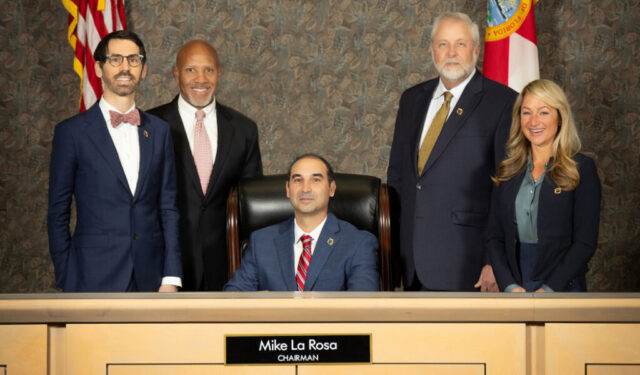
The Florida Public Service Commission (PSC) will begin hearings on Monday to consider Florida Power & Light Co.’s (FPL) petition for a base rate increase that, while lower than its originally proposed $10 billion hike, would still provide a return on equity higher than the national average.
FPL is the state’s largest investor-owned utility servicing approximately 12 million people. Its originally proposed four-year $9.8 billion rate hike offered earlier this year was blasted by consumer advocates, who labeled it the largest utility rate hike in U.S. history.
Shortly before the PSC was scheduled to hold hearings on that proposal in August, FPL announced that they had reached an 11th-hour “agreement in principle” working with what it described as a “diverse” group of organizations including Walmart, RaceTrac, Wawa, and the Florida Retail Federation. The new proposal reduced the rate increase to $7 billion but still maintained a return on equity (ROE) of 10.95%. ROE is a measure of a company’s financial performance.
“It dropped the ROE, but the rate hike increase is still 10% higher for small business customers,” said Shelby Green, research and communications manager with the Energy and Policy Institute. “So, residential customers are saving a little bit of money through FPL’s proposed settlement. Corporations are saving millions, but then the small business customers would actually pay 10% more compared to FPL’s originally filed proposal.”
“This settlement agreement is a win for all FPL customers and a win for Florida,” said FPL President and CEO Armando Pimentel in a written statement at the time.
“It supports our ongoing commitment to meet the resiliency and reliability needs of our fast-growing state, while keeping customer bills well below the national average. We expect the typical 1,000-kWh residential customer bill will increase next year by about $3.79 a month. Even with the proposed increase, FPL’s bill would be about 20% lower than it was 20 years prior when adjusted for inflation.”
FPL’s revised proposal received pushback from the Office of Public Counsel (OPC), designated by law to represent Florida consumers. The OPC worked with organizations such as Florida Rising and the League of United Latin American Citizens of Florida (LULAC) and came up with their own counterproposal, which did not include any input from FPL.
Their proposal would cut the base bill by nearly half for the average residential customer compared to FPL’s original proposal, to $5.2 billion. Their proposed ROE for FPL would be 10.6%.
‘Indispensable party’
PSC Chairman Mike La Rosa rejected the OPC proposal on Sept. 12, saying FPL was “an indispensable party to any settlement.” He added that while their proposal could not be presented as a settlement agreement, it could be included as part of their testimony in opposition to FPL’s agreement submitted in late August.
Attorneys for the OPC and allies filed a motion for reconsideration to the PSC on Sept. 19, saying the Florida Supreme Court has never ruled on whether a utility would have to be a party to a settlement, the News Service of Florida reported.
Last month, the Collier County Commission unanimously passed a resolution rejecting FPL’s proposed rate hike. Commissioner Bert Saunders said during the meeting, “I think all of us need to be aware that one of the biggest lobbies in Tallahassee is our power companies, and by doing this resolution, it’s putting our legislators on notice that they have to be mindful of what it is that they’re imposing upon our community.”
“We’re not going to sit back and let a powerful company stick something down our throats without speaking back and without fighting back, and that’s what this resolution is all about,” added Commissioner Chris Hall.
The FPL rate case hearing is scheduled to start on Monday at the PSC’s headquarters in Tallahassee and last until Oct. 17.
Disclaimer
The information contained in South Florida Reporter is for general information purposes only.
The South Florida Reporter assumes no responsibility for errors or omissions in the contents of the Service.
In no event shall the South Florida Reporter be liable for any special, direct, indirect, consequential, or incidental damages or any damages whatsoever, whether in an action of contract, negligence or other tort, arising out of or in connection with the use of the Service or the contents of the Service. The Company reserves the right to make additions, deletions, or modifications to the contents of the Service at any time without prior notice.
The Company does not warrant that the Service is free of viruses or other harmful components
This article originally appeared here and was republished with permission.












